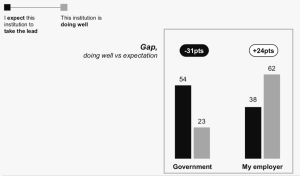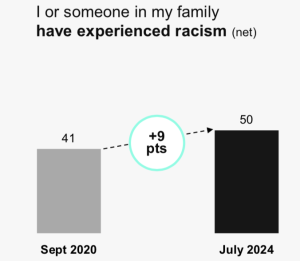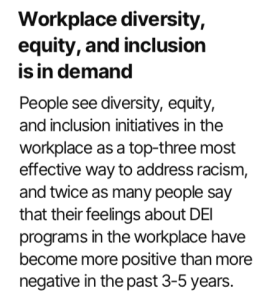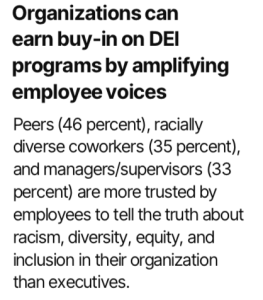When it comes to knowing where ordinary folk go to, to find their optimum sources of ‘trust’, Edelman’s annual ‘Trust Barometer’ has been essential reading for years.
Revealing trends in trust associated with the media organizations, government and even the nation’s employers (broken down by industry sector), the yearly findings have always produced – and continue to produce – important insights, such as low continued trust in social media, and how expectations are changing.
This year, the barometer is once again essential reading [trust of companies headquartered in the US, for example, is down 9 percentage points, to just 53% this year] – with journalists and reporters mow judged to be more likely to tell the truth than business leaders.
It also finds that CEOs are judged to be only ‘neutral’ when it comes to telling employees the truth about new innovations and new technologies, and what impact they will have on them.
This year though, what’s adding to all this, is the 5th iteration of a separate, special report Edelman that produces to go alongside this – research around the important topic of racial injustice.
The just-published ‘2024 Edelman Trust Barometer Special Report: Business and Racial Justice’ questioned more than 3,200 people in the US specifically, in May of this year.
The headline results make uncomfortable reading, with evidence suggesting there has been a sharp rise in people’s personal experience of racism since 2020.
Some 67% of people now say they are concerned about systemic racism and racial injustice in the US, while the percentage of people who say they’ve experienced racism is now at 50% – up nine percentage points in just the last four years.
Employers’ role in all of this
But it’s the extent to which employers are seen to be tackling this that also makes interesting reading too.
Of five different institutions that respondents were asked to chose between for where they felt the lead should be taken around racial injustice (these were government, my employer, the media, NGOs and business (ie business more generally), what’s significant is that the ‘my employer’ choice was second only to government (at 38%).

Significant also was the fact the ‘My Employer’ option also reported the second-highest rise in expectation for leadership on this issue compared to last year – with this seeing an eight percentage point rise.
In fact, taking this line of questioning further, the data additionally revealed that where government is seen to be ‘failing’ to meet people’s expectations here, employers are actually ‘exceeding’.
Not only this, only the ‘My employer’ choice was truly trusted to address racism in the US – registering a score of 71 (a score of 60-100 means ‘trusted) – which is 20 points higher than the next institution.

So does this new data herald a good news story we’ve all been waiting for – that employers really are leading the way in rooting out racial inequality?
Or should it still be a wake up call to implore DEI heads not to rest of their laurels just yet?
To look into some of this in a bit more detail, TLNT exclusively interviewed Trisch Smith, Edelman’s global chief diversity, equity & inclusion officer:
Q: Looking at some of the broad themes of the data, what is it telling you about race inequality right now?:
A: “Very broadly, it reveals there is still clearly a sense of distrust in institutions around the promotion of racial inequality. There is a higher expectation for government to be doing more, and yet it is doing the worst of all the institutions. It’s interesting that the business community at large is seen to be more trusted right now.”

Q: Do you think this points the way to there being an even ‘greater’ need for a DEI presence in organizations – at a time when there have been calls for firms to row-back on having DEI heads?
A: “What the research actually shows is that more people see the presence of DEI in the workplace as a positive than a negative – in fact people are more than twice as likely to say their view of workplace DEI initiatives has improved rather than declined. I think people are welcome diversity of ideas within businesses, and so while some companies are reportedly rolling back on DEI, we hope our data serves to arrest this. We feel that companies are often pulling back on DEI through misinformation. What we actually show is that there is widespread support for racial equality throughout different demographic groups.”
Q: What are companies potentially getting wrong about DEI then?
A: “I think many companies have pigeon-holed DEI as a ‘initiative, when it should really be ‘business as normal’. The benefits are there for all to see, and this is what people should be concentrating on, rather than weaponizing it. Fear of DEI is misguided, but fear is being fuelled by politicians, and social media, and the like. The thing about DEI that people need to remember is that it’s adding a seat at the boardroom table, not taking any away.”
Q: It is a frustration that fear of doing DEI exists, when all your data points to businesses being the natural home of initiatives to improve racial inequality?
A: “It’s certainly frustrating that we still seem to have to demonstrate the value of DEI – when it should really be so obvious now. Businesses do still need to lead with this, and with a sense of courage despite the attacks, and this is what I hope will happen. We’ve got to remember, that we’re seeing an uptick in those that say they have experienced racism – which is not good. We’re seeing rising concern about racism, and that’s not good either. The positive trend though, is that there is demand for DEI that’s returned back to the high of 2020. This was the height of the George Floyd, Black Lives Matter movement. However we also need to see that right now, we are living in the backdrop of real political polarization too, and there being lots of division being sown.

Q: Are you seeing hesitancy – especially amongst fellow CHROs – around DEI because of legal changes – such as judgements about positive discrimination?
A: “Adjudications around positive discrimination were just against colleges, but there have naturally been questions around what this means for businesses too. I think the intention needs to be ‘no to quotas, but yes for aspirational goals’. My concern is that people will simply say [or already are saying], we can’t follow ‘x’ or ‘y’ policy at all now, because DEI is hated. That just isn’t the case. It once again relates to there being fear, and misguided information.
Q: Do companies feel that even if they do have great DEI initiatives, the published data won’t show big enough change, and they’ll be unfairly judged?
A: “I do think this is an issue, yes. Companies can have numerous and amazing policies that foster greater diversity and inclusion, but it takes time for them to show up in their own data. So they may then feel that their efforts are not feeding through – despite their good intentions – and they may also feel that they are being unfairly judged. I think we all – as CHROs – have to accept that people always expect to see results quicker than they might actually take, and so they need to give their policies appropriate timelines. The best policies are those that aren’t just top-down, but bottom up, because this is when everyone sees themselves as part of the solution.”
OTHER TOP FINDINGS:


